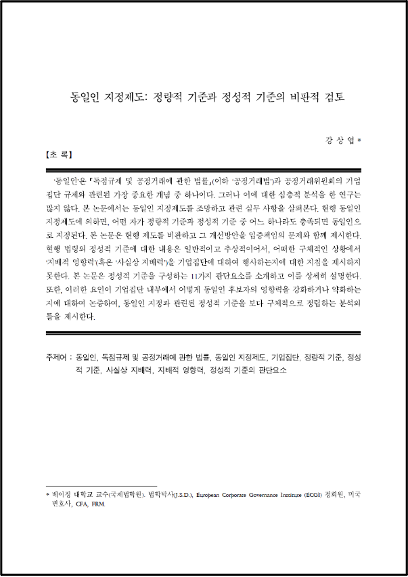Recently, Professor Sang Yop Kang published two articles (written in Korean). The topics of these two articles are related to the intersection of competition law and corporate law. The first article isThe Same-Person’Designation System: A Critical Review of theQuantitative Standard and the Qualitative Standard(동일인 지정제도: 정량적 기준과 정성적 기준의 비판적 검토). This article was published in The Economic Law Journal (경제법 연구) (the Second Issue of Volume 20), which is one of top law journals (specializing in competition law) in Korea.
In the Monopoly Regulation and Fair Trade Act (MRFTA), “the same person” is referred to as a controlling shareholder of a corporate group. Professor Kang analyzed “the same person” designation system in Korea, which is the foundation of corporate-group regulations in the MRFTA. The following is the abstract of Professor Kang’s first article.
‘The same person’ is one of the most important concepts concerning the corporate-group regulation by the Monopoly Regulation and Fair Trade Act and the Korea Fair Trade Commission. Until recently, however, few studies have conducted an in-depth analysis of this concept and the relevant issues. This article examines ‘the same-person’ designation system and related practical matters. According to the current ‘same-person’ designation system, if a person meets either quantitative or qualitative standard, the person is designated as ‘the same person.’ This article criticizes the current designation system and provides suggestions to improve the designation system based on the ‘burden of proof.’ The contents of the qualitative standard of the current designation system are general and abstract. Thus, the qualitative standard does not explain under what specific circumstances ‘the same person’ exerts a ‘dominant influence’ (or ‘de facto control’) over a corporate group. This article introduces the 11 judgment factors constituting the qualitative standard and reviews them in detail. In addition, by demonstrating how these factors strengthen or weaken the influence of the same-person candidate within a corporate group, this article presents an analytical framework that more specifically establishes the qualitative standard related to the ‘same-person’ designation.
The second article that Professor Kang recently published isThe Same Person Designation System and the Acquisition, Holding, and Disposal of Treasury Stock: The Qualitative-Criteria Based Analysis(동일인 지정제도와 자기주식의 취득, 보유 및 처분: 정성적 기준을 중심으로). This article was published in The Competition Law Journal (경쟁법 연구) (Volume 44), which is also one of the top law journals (specializing in competition law) in Korea. The following is the abstract of Professor Kang’s second article.
Even if a person in a corporate group in Korea is not designated as ‘the same person’ according to the quantitative criteria, the Korea Fair Trade Commission (KFTC) may designate the same person based on the qualitative criteria concerning ‘treasury stock.’ Since many corporate groups in Korea have acquired and held treasury stock, this issue is crucial in relation to the designation of the same person. Still, there is hardly any detailed explanation by the regulatory agency (KFTC) or discussion in the Fair-Trade-Law related practice circles and academia. Treasury stock can be abused as a tool to defend a controlling shareholder’s control over a corporate group. On the other hand, it should be noted that treasury stock is one of a few takeover defense devices allowed under the Korean legal system. Treasury stock also has its corporate finance functions, such as returning the company’s free cash flows to the shareholders. In addition, when applying the qualitative criteria for designation of the same person, the KFTC should distinguish between the situation in which treasury shares have been ‘already’ transferred to a friendly third party, and the situation where there is merely a ‘possibility’ of being transferred but not currently transferred. Since treasury stock is a common phenomenon in the corporate world and the capital market, various discussions on the acquisition, holding, and disposal of treasury stock are expected in the near future with respect to the same person designation system and related regulations. The Author hopes that this paper will contribute to establishing more specific and systematic guidelines for the KFTC regarding treasury stock when designating the same person.


Article in the left-hand side: The Same-Person’Designation System: A Critical Review of the Quantitative Standard and the Qualitative Standard(동일인 지정제도: 정량적 기준과 정성적 기준의 비판적 검토); Article in the right-hand-side:The Same Person Designation System and the Acquisition, Holding, and Disposal of Treasury Stock: The Qualitative-Criteria Based Analysis(동일인 지정제도와 자기주식의 취득, 보유 및 처분: 정성적 기준을 중심으로) Professor Kang is Professor of Law (full professorship with tenure) at Peking University, School of Transnational Law. He teaches and researches in the areas of corporate governance, corporate law (general theory; US; Korea; China), securities regulations, M&As, law and economics, ESG (Environmental, Social, and Governance), capital markets, financial market regulations, banking policies and regulations, startups and venture capitals, competition law (anti-trust), the 4th industrial revolution, corporate groups, institutional investors, hedge funds and private equity funds, shareholder activism, stewardship, law and finance, executive compensation, Chinese economic policies, Chinese corporate governance, East Asian economies and legal systems, political economy, etc.
Professor Kang holds J.S.D. (Doctor of the Science of Law) degree at Columbia University School of Law. He is a Research Member of the ECGI (European Corporate Governance Institute), a prestigious global academic association for the corporate governance scholarship (law, economics, and finance). Professor Kang is a lawyer. Also, he is a CFA (Chartered Financial Analyst) and a FRM (Financial Risk Manager) charter-holder.